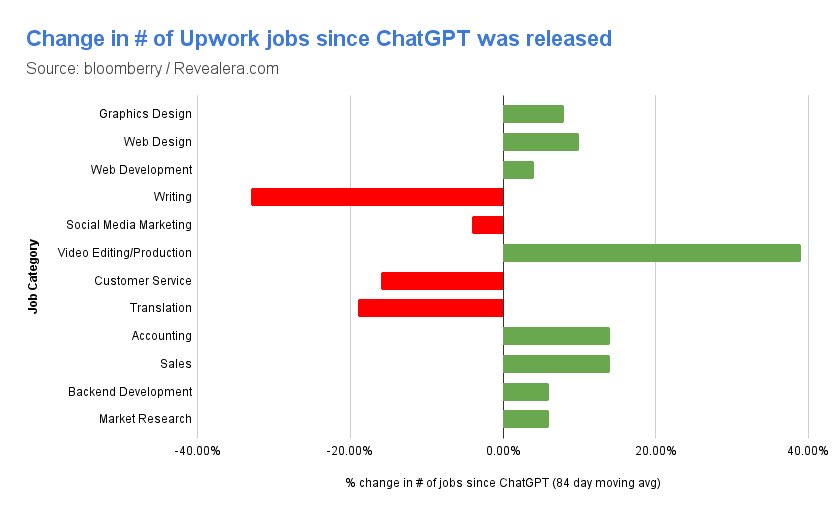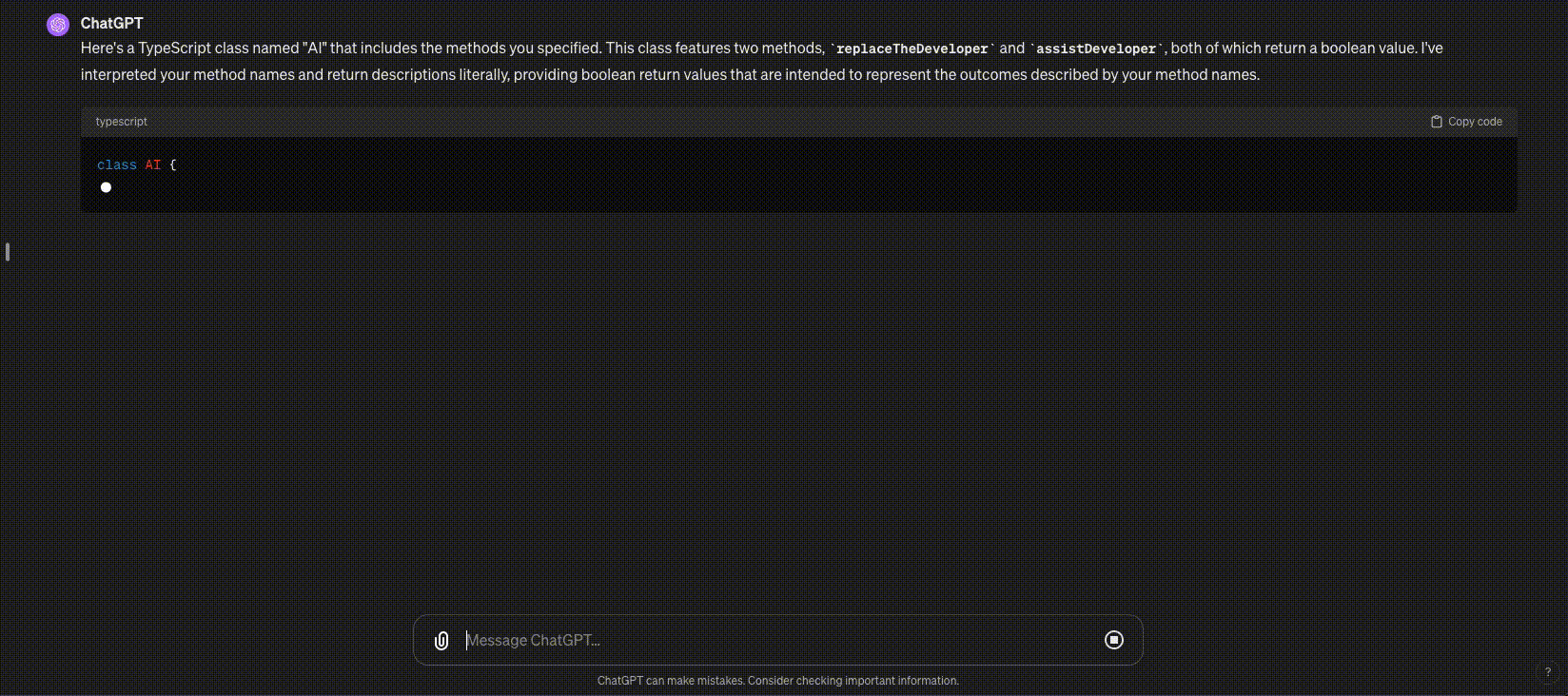At a time when new AI tools are being released every week, sparking discussions about the complete replacement of developers, it’s legitimate to ask whether it’s still relevant to learn to code in 2024. On February 12, 2024, at a conference in Dubai, NVIDIA CEO Jensen Huang publicly spoke of the end of the need to learn programming. Last week, it was Devin AI, a tool presented as the first AI software engineer by the company Cognition, that made a lot of news (it’s not actually the first, but I’ll talk about that in another dedicated article). Devin AI’s promise is to be able to autonomously develop complex and complete applications. Its announcement generated countless publications and articles headlined “The end of developers!” or “Software engineers out of a job”. I myself hesitated to call this article “Developers, it’s ciao!!!”, but then I came to my senses 😅 After all, the purpose of this blog is precisely to cut through all the sensationalism surrounding artificial intelligence by bringing you a realistic expert analysis, which I hope will enable you to make the most of this incredible technology, and also to protect yourself from it.
My professional activities include teaching programming and artificial intelligence to students at higher education establishments in Paris and Bordeaux. And this question of the relevance of learning to code comes up again and again. So what’s really going on?
AI’s impact on the development world in 2024
Several professions are already affected by the arrival of generative AI tools, as shown in this graph taken from a study by the Bloomberry website.

The editorial and translation professions, for example, are heavily impacted.
Indeed, in some areas, such as writing advertising content or horoscopes, it’s possible to sacrifice quality for quantity and cost savings, but in programming, it’s a completely different story! First of all, the basics: bad code generally just doesn’t work. And if it does work, unclean and unoptimized code will lead to poor performance, more bugs, a lack of project scalability, and it will quickly become difficult to work on it properly. In short, when it comes to code, quality is non-negotiable!
The emergence of artificial intelligence (AI) tools has already begun to impact the job market for developers, albeit in a nuanced way for the time being. AI tools, such as LLMs (Large Language Models) and AI-assisted development platforms, are in widespread use, with 92% of US-based developers working in companies with over 1,000 employees using AI tools for code.
However, the impact of AI on the job market for developers is not just positive or negative, but rather complex and multifaceted. On the one hand, AI is opening up new opportunities for developers, creating a need for specialized skills in the development and management of AI systems. For example, developing generative AI solutions with Azure OpenAI Service and other similar technologies requires specialized skills. On the other hand, some developers feel threatened by AI, fearing that automation and AI tools could reduce job prospects in certain areas of software development.
It’s important to note that, despite these fears, the IT sector expects to create over 100,000 additional jobs by 2030, with a significant rise in IT engineering positions. This suggests that, while AI can automate certain tasks, it also creates new job opportunities and specializations for developers.
What’s more, generative AI is not yet in a position to completely replace developers – far from it. But any developer who uses AI tools on a daily basis will tell you: it has already changed the profession. This saves a great deal of time when writing code. The research and training process, which is an important part of the job, has evolved to become more fluid. Some necessary but less interesting tasks can be partially automated, such as creating tests or writing documentation.
On the other hand, I’ve been reading and hearing a lot about how many companies are hiring fewer developers, and there’s even been a significant drop in requests for assignments on freelance platforms. But as always, numbers can be made to say whatever you want, and it’s important to analyze them with full context, and not just take the shortcut of “It’s AI’s fault!”
Indeed, the economic situation in Europe is not ideal, with a burst financial bubble and a banking sector in crisis. As far as the decline in freelance assignments is concerned, a recent reform in France is encouraging companies to recruit new employees internally. The aim here is not to go into detail, but simply to put the current impact of AI on the IT market into perspective. If you’d like to know more about the economic context, I invite you to read this free-work article which sums up the situation.
However, despite this context, there are real cases of jobs being lost to AI. Some companies, for example, will keep just one junior instead of two, but that junior will be able to do just as much work with the help of AI tools. Junior profiles are the hardest hit, as a significant proportion of the tasks they are usually entrusted with can be carried out largely by AIs. These are execution tasks, such as integration or writing unit tests. What’s more, the supervision time required to employ an AI is no greater than that needed for a junior profile.
Towards greater automation? Future prospects for developers

And as far as the future is concerned, it’s certain that this evolution will only accelerate, and that the limits we know today will no longer be there tomorrow. If we’re already talking about the emergence of AI models that are capable of self-improvement, then there’s no doubt that, in time, we’ll see the emergence of AI models and tools that will be able to code everything, and better than any developer (I’m actually preparing an article on the subject), but this isn’t a foregone conclusion, and the road between now and then is littered with great opportunities.
Why is learning to code in 2024 still essential?
My view is that learning to code is still very relevant, for several reasons:
- The supply of junior profiles has already started to fall, but there’s so much fear that the developer profession will disappear, that there will automatically be a drop in the number of new developers too.
- One of the most sought-after skills in a developer is autonomy, and generative AI enables a junior developer to be much more autonomous. Mind you, far be it from me to underestimate the importance of being trained by experienced peers. It’s all about clearing the way with AI, so that juniors don’t have to worry about asking too many questions, and seniors can save time by concentrating on the essentials.
- It should be some time before AI no longer requires human supervision for all code-related tasks. Demand for more experienced profiles is likely to remain strong for some time to come. Linking this to the decline in the number of new developers, those starting out today should be the ones in demand tomorrow, with less competition.
- AI is a remarkable tool for accelerating your skills development, and thus gaining faster access to the level sought by the majority of companies.
- And finally, if you’re still not convinced, let’s zoom out a little further. Beyond code, AI raises the question of the evolution of a very large number of professions. There’s no doubt about it today: the new generation will be navigating a constantly evolving professional life; they’ll be working in several different professions over the course of their careers.
How to get started in programming in 2024: Practical advice
- Keep abreast of the latest developments in AI, know how to spot high value-added tools in your field of expertise, and quickly get to grips with them to make the most of them.
- Take the time to set up processes and automations that will save you precious time, but without compromising on quality.
- Specialize in artificial intelligence. What could be better, after all, than to become the one to whom all those who haven’t yet jumped on the AI bandwagon will turn? And that goes without saying, but only if you find it motivating!
In conclusion, the future of development and artificial intelligence is rich in opportunities and challenges. Whether you’re already in the business or thinking of diving into this fascinating universe, staying informed is crucial.
Don’t miss out on any AI-related opportunities: AI is evolving at breakneck speed, and it’s essential to keep up to date with the latest advances, tools and perspectives. By subscribing to our newsletter, you’ll receive cutting-edge analysis, recent discoveries and practical tips for navigating the world of AI with confidence, straight to your inbox. Click here to subscribe to our newsletter.
Take action today: If you’re interested in personalized consulting services or artificial intelligence training for all levels, don’t hesitate to contact me. Whether you’re looking to enhance your skills, train students, develop innovative projects, or integrate AI into your business, I’m here to support you every step of the way. Contact me directly to find out more about my AI consulting and training services.
Finally, this is the first post on this blog, and I’d be delighted to read your feedback or suggestions in the comments for future posts!
If you don't want to miss any AI opportunities
Subscribe to our newsletter!